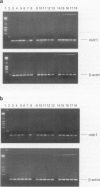Abstract
Reversal of multidrug resistance (MDR) may offer a means of increasing the effectiveness of tumour chemotherapy. A variety of recent evidence indicates that cytokines may be particularly useful in this endeavour. To investigate the molecular mechanism by which cytokines may sensitise multidrug-resistant colon carcinoma cells, HCT15 and HCT116, to treatment with MDR-related drugs, we evaluated the effects of the human cytokines tumour necrosis factor alpha (TNF alpha), interleukin 2 (IL-2) and interferon gamma (IFN gamma) on mdr1 gene expression at the mRNA level by reverse transcription-polymerase chain reaction (RT-PCR) and at the protein level with monoclonal antibodies by immuno flow cytometry. P-glycoprotein function was examined after accumulation of the fluorescent drug, doxorubicin, by flow cytometry. Chemosensitivity to doxorubicin and vincristine was analysed using the XTT assay. All three cytokines were found to modulate the MDR characteristics on mdr1 expression levels, P-glycoprotein function and measured chemosensitivity to MDR-associated anti-cancer drugs. This cytokine-induced reversal of MDR was strongly time dependent, with maximal effects after 48 and 72 h of cytokine treatment. If similar modulation of MDR phenotype can be obtained in in vivo models, it may be possible to verify the time course for modulation by cytokine treatment and to design appropriate clinical trials of this strategy for MDR reversal.
Full text
PDF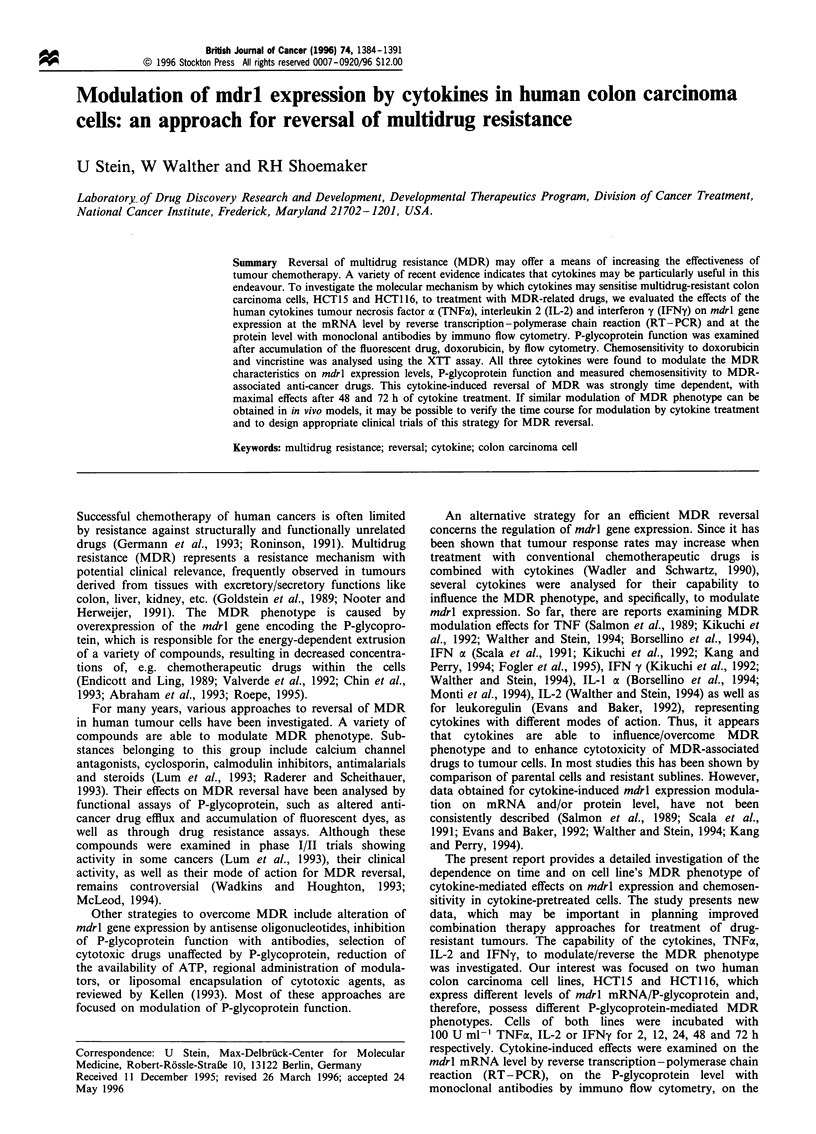
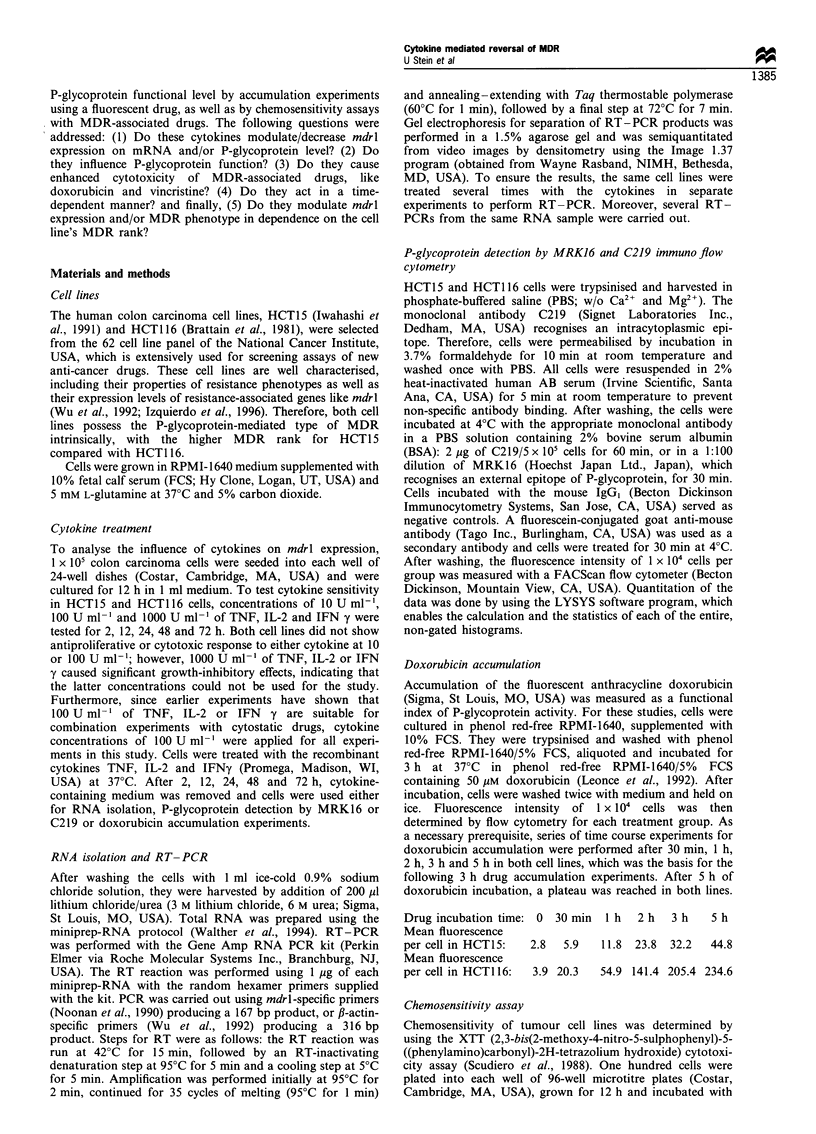
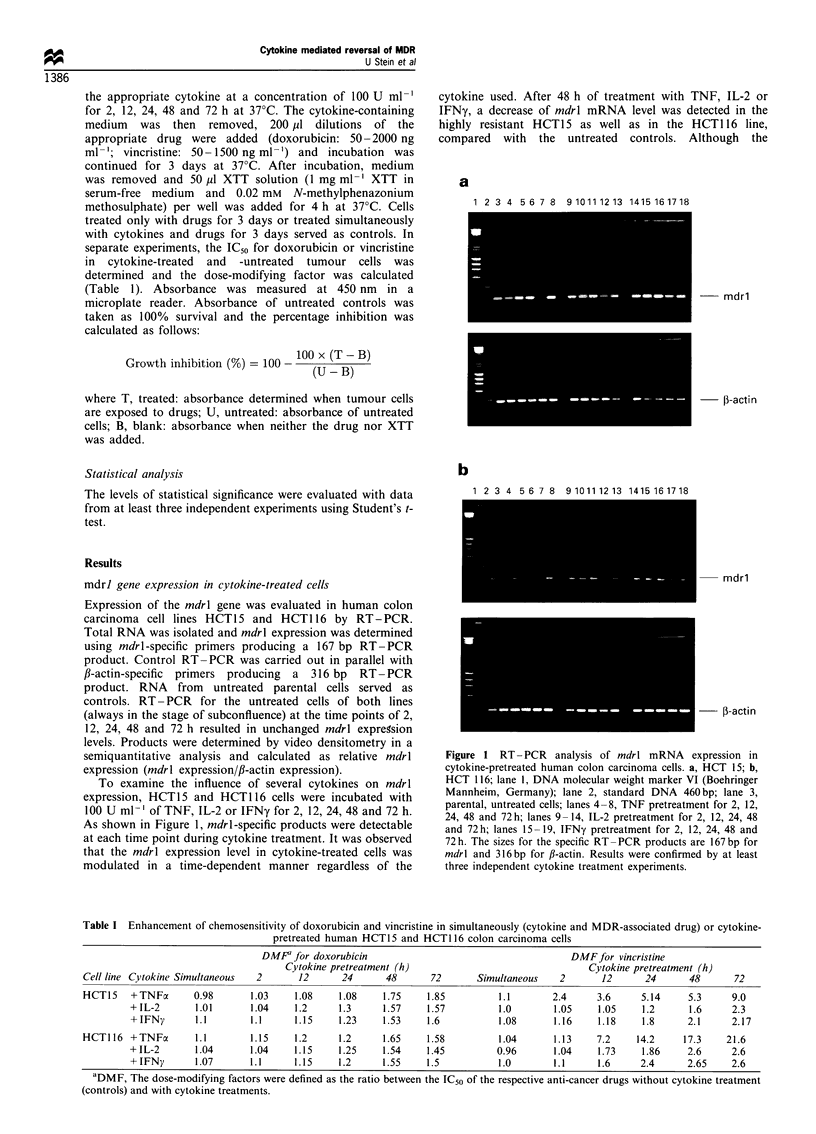
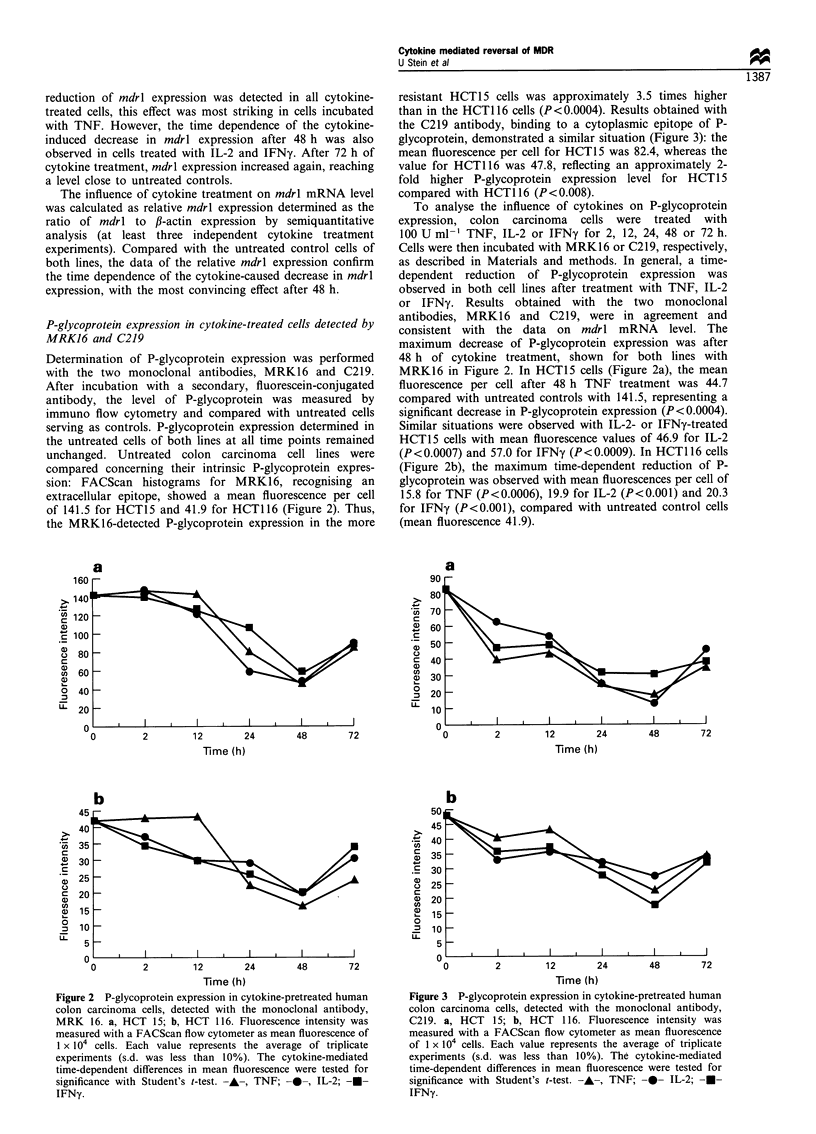
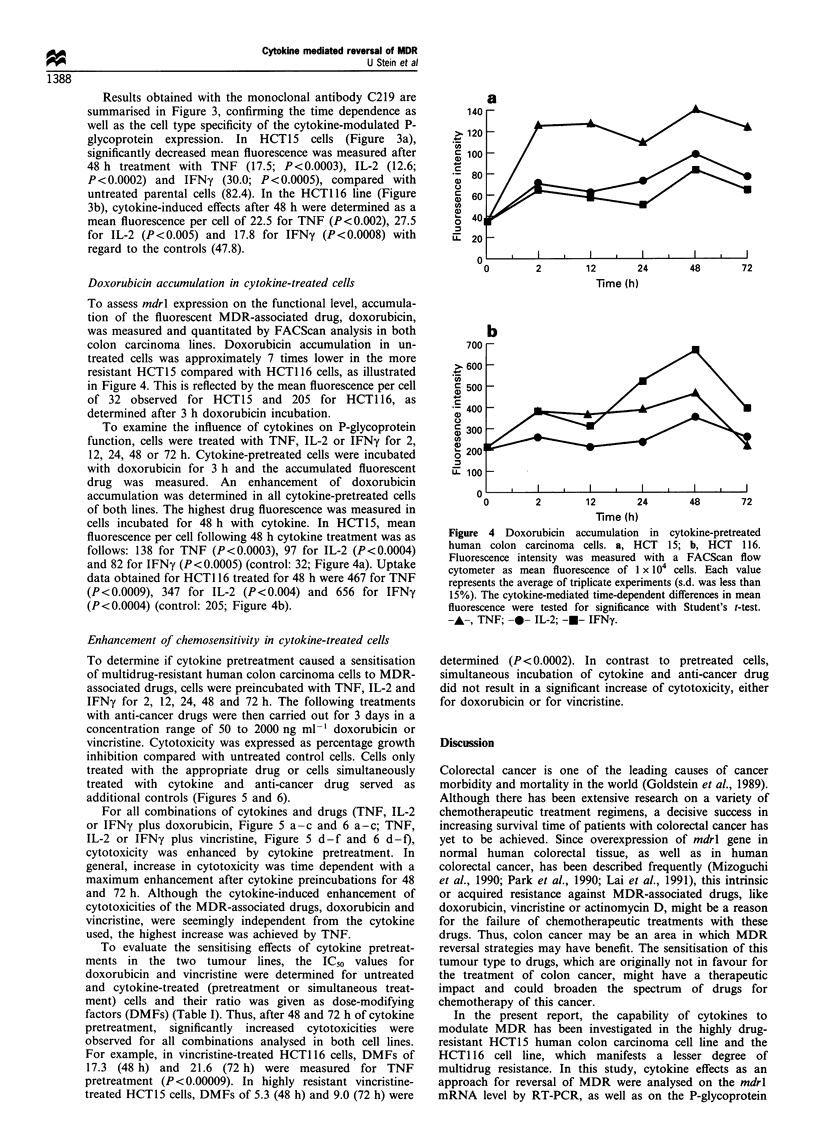
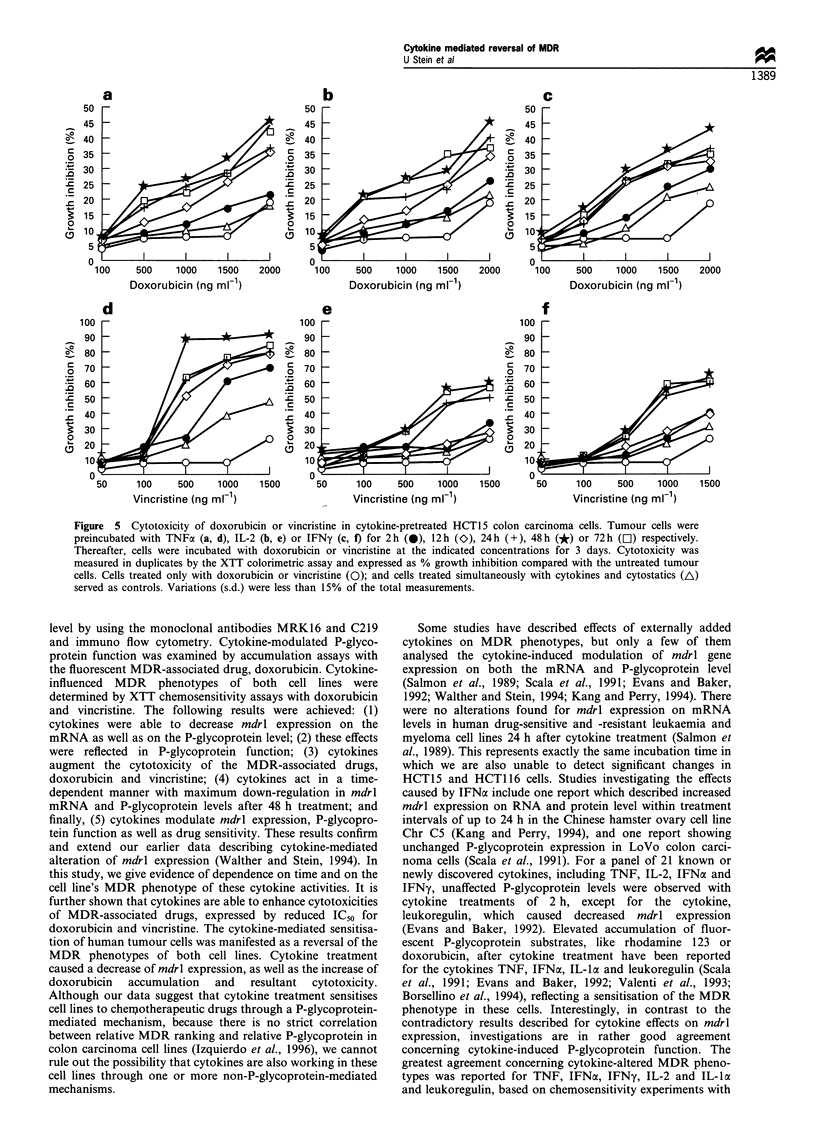
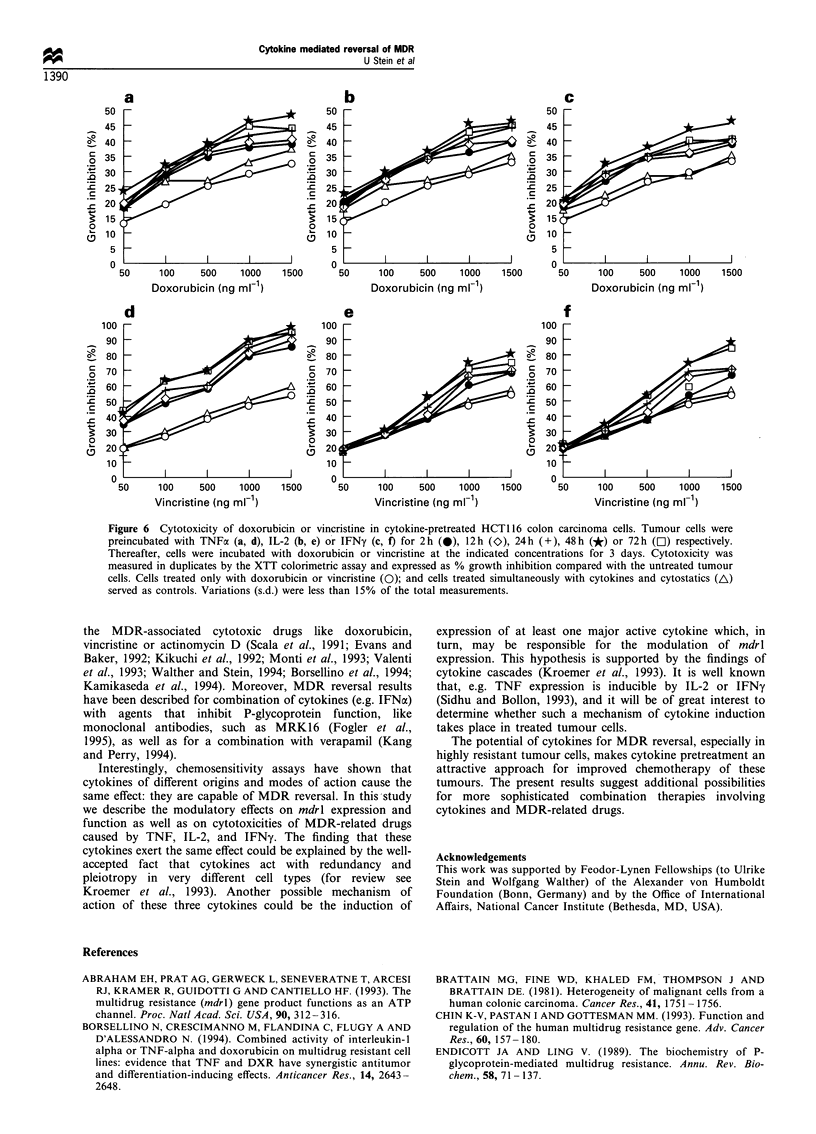
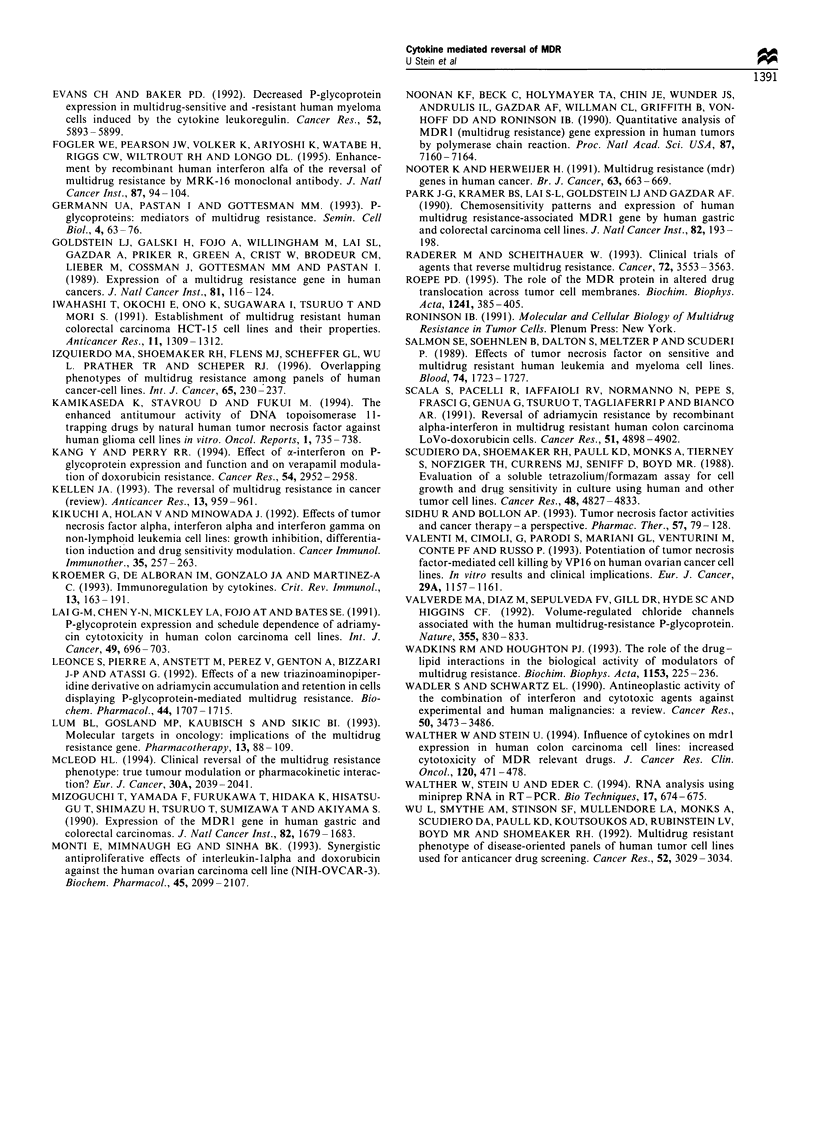
Images in this article
Selected References
These references are in PubMed. This may not be the complete list of references from this article.
- Abraham E. H., Prat A. G., Gerweck L., Seneveratne T., Arceci R. J., Kramer R., Guidotti G., Cantiello H. F. The multidrug resistance (mdr1) gene product functions as an ATP channel. Proc Natl Acad Sci U S A. 1993 Jan 1;90(1):312–316. doi: 10.1073/pnas.90.1.312. [DOI] [PMC free article] [PubMed] [Google Scholar]
- Borsellino N., Crescimanno M., Flandina C., Flugy A., D'Alessandro N. Combined activity of interleukin-1 alpha or TNF-alpha and doxorubicin on multidrug resistant cell lines: evidence that TNF and DXR have synergistic antitumor and differentiation-inducing effects. Anticancer Res. 1994 Nov-Dec;14(6B):2643–2648. [PubMed] [Google Scholar]
- Brattain M. G., Fine W. D., Khaled F. M., Thompson J., Brattain D. E. Heterogeneity of malignant cells from a human colonic carcinoma. Cancer Res. 1981 May;41(5):1751–1756. [PubMed] [Google Scholar]
- Chin K. V., Pastan I., Gottesman M. M. Function and regulation of the human multidrug resistance gene. Adv Cancer Res. 1993;60:157–180. doi: 10.1016/s0065-230x(08)60825-8. [DOI] [PubMed] [Google Scholar]
- Endicott J. A., Ling V. The biochemistry of P-glycoprotein-mediated multidrug resistance. Annu Rev Biochem. 1989;58:137–171. doi: 10.1146/annurev.bi.58.070189.001033. [DOI] [PubMed] [Google Scholar]
- Evans C. H., Baker P. D. Decreased P-glycoprotein expression in multidrug-sensitive and -resistant human myeloma cells induced by the cytokine leukoregulin. Cancer Res. 1992 Nov 1;52(21):5893–5899. [PubMed] [Google Scholar]
- Fogler W. E., Pearson J. W., Volker K., Ariyoshi K., Watabe H., Riggs C. W., Wiltrout R. H., Longo D. L. Enhancement by recombinant human interferon alfa of the reversal of multidrug resistance by MRK-16 monoclonal antibody. J Natl Cancer Inst. 1995 Jan 18;87(2):94–104. doi: 10.1093/jnci/87.2.94. [DOI] [PubMed] [Google Scholar]
- Germann U. A., Pastan I., Gottesman M. M. P-glycoproteins: mediators of multidrug resistance. Semin Cell Biol. 1993 Feb;4(1):63–76. doi: 10.1006/scel.1993.1008. [DOI] [PubMed] [Google Scholar]
- Goldstein L. J., Galski H., Fojo A., Willingham M., Lai S. L., Gazdar A., Pirker R., Green A., Crist W., Brodeur G. M. Expression of a multidrug resistance gene in human cancers. J Natl Cancer Inst. 1989 Jan 18;81(2):116–124. doi: 10.1093/jnci/81.2.116. [DOI] [PubMed] [Google Scholar]
- Iwahashi T., Okochi E., Ono K., Sugawara I., Tsuruo T., Mori S. Establishment of multidrug resistant human colorectal carcinoma HCT-15 cell lines and their properties. Anticancer Res. 1991 May-Jun;11(3):1309–1312. [PubMed] [Google Scholar]
- Izquierdo M. A., Shoemaker R. H., Flens M. J., Scheffer G. L., Wu L., Prather T. R., Scheper R. J. Overlapping phenotypes of multidrug resistance among panels of human cancer-cell lines. Int J Cancer. 1996 Jan 17;65(2):230–237. doi: 10.1002/(SICI)1097-0215(19960117)65:2<230::AID-IJC17>3.0.CO;2-H. [DOI] [PubMed] [Google Scholar]
- Kang Y., Perry R. R. Effect of alpha-interferon on P-glycoprotein expression and function and on verapamil modulation of doxorubicin resistance. Cancer Res. 1994 Jun 1;54(11):2952–2958. [PubMed] [Google Scholar]
- Kellen J. A. The reversal of multidrug resistance in cancer (review). Anticancer Res. 1993 Jul-Aug;13(4):959–961. [PubMed] [Google Scholar]
- Kikuchi A., Holán V., Minowada J. Effects of tumor necrosis factor alpha, interferon alpha and interferon gamma on non-lymphoid leukemia cell lines: growth inhibition, differentiation induction and drug sensitivity modulation. Cancer Immunol Immunother. 1992;35(4):257–263. doi: 10.1007/BF01789332. [DOI] [PMC free article] [PubMed] [Google Scholar]
- Kroemer G., Moreno de Alborán I., Gonzalo J. A., Martínez C. Immunoregulation by cytokines. Crit Rev Immunol. 1993;13(2):163–191. [PubMed] [Google Scholar]
- Lai G. M., Chen Y. N., Mickley L. A., Fojo A. T., Bates S. E. P-glycoprotein expression and schedule dependence of adriamycin cytotoxicity in human colon carcinoma cell lines. Int J Cancer. 1991 Nov 11;49(5):696–703. doi: 10.1002/ijc.2910490512. [DOI] [PubMed] [Google Scholar]
- Lum B. L., Gosland M. P., Kaubisch S., Sikic B. I. Molecular targets in oncology: implications of the multidrug resistance gene. Pharmacotherapy. 1993 Mar-Apr;13(2):88–109. [PubMed] [Google Scholar]
- Léonce S., Pierré A., Anstett M., Pérez V., Genton A., Bizzari J. P., Atassi G. Effects of a new triazinoaminopiperidine derivative on adriamycin accumulation and retention in cells displaying P-glycoprotein-mediated multidrug resistance. Biochem Pharmacol. 1992 Nov 3;44(9):1707–1715. doi: 10.1016/0006-2952(92)90063-o. [DOI] [PubMed] [Google Scholar]
- McLeod H. L. Clinical reversal of the multidrug resistance phenotype: true tumour modulation or pharmacokinetic interaction? Eur J Cancer. 1994;30A(14):2039–2041. doi: 10.1016/0959-8049(94)00423-3. [DOI] [PubMed] [Google Scholar]
- Mizoguchi T., Yamada K., Furukawa T., Hidaka K., Hisatsugu T., Shimazu H., Tsuruo T., Sumizawa T., Akiyama S. Expression of the MDR1 gene in human gastric and colorectal carcinomas. J Natl Cancer Inst. 1990 Nov 7;82(21):1679–1683. doi: 10.1093/jnci/82.21.1679. [DOI] [PubMed] [Google Scholar]
- Monti E., Mimnaugh E. G., Sinha B. K. Synergistic antiproliferative effects of interleukin-1 alpha and doxorubicin against the human ovarian carcinoma cell line (NIH:OVCAR-3). Biochem Pharmacol. 1993 May 25;45(10):2099–2107. doi: 10.1016/0006-2952(93)90022-o. [DOI] [PubMed] [Google Scholar]
- Noonan K. E., Beck C., Holzmayer T. A., Chin J. E., Wunder J. S., Andrulis I. L., Gazdar A. F., Willman C. L., Griffith B., Von Hoff D. D. Quantitative analysis of MDR1 (multidrug resistance) gene expression in human tumors by polymerase chain reaction. Proc Natl Acad Sci U S A. 1990 Sep;87(18):7160–7164. doi: 10.1073/pnas.87.18.7160. [DOI] [PMC free article] [PubMed] [Google Scholar]
- Nooter K., Herweijer H. Multidrug resistance (mdr) genes in human cancer. Br J Cancer. 1991 May;63(5):663–669. doi: 10.1038/bjc.1991.152. [DOI] [PMC free article] [PubMed] [Google Scholar]
- Park J. G., Kramer B. S., Lai S. L., Goldstein L. J., Gazdar A. F. Chemosensitivity patterns and expression of human multidrug resistance-associated MDR1 gene by human gastric and colorectal carcinoma cell lines. J Natl Cancer Inst. 1990 Feb 7;82(3):193–198. doi: 10.1093/jnci/82.3.193. [DOI] [PubMed] [Google Scholar]
- Raderer M., Scheithauer W. Clinical trials of agents that reverse multidrug resistance. A literature review. Cancer. 1993 Dec 15;72(12):3553–3563. doi: 10.1002/1097-0142(19931215)72:12<3553::aid-cncr2820721203>3.0.co;2-b. [DOI] [PubMed] [Google Scholar]
- Roepe P. D. The role of the MDR protein in altered drug translocation across tumor cell membranes. Biochim Biophys Acta. 1995 Dec 20;1241(3):385–405. doi: 10.1016/0304-4157(95)00013-5. [DOI] [PubMed] [Google Scholar]
- Salmon S. E., Soehnlen B., Dalton W. S., Meltzer P., Scuderi P. Effects of tumor necrosis factor on sensitive and multidrug resistant human leukemia and myeloma cell lines. Blood. 1989 Oct;74(5):1723–1727. [PubMed] [Google Scholar]
- Scala S., Pacelli R., Iaffaioli R. V., Normanno N., Pepe S., Frasci G., Genua G., Tsuruo T., Tagliaferri P., Bianco A. R. Reversal of adriamycin resistance by recombinant alpha-interferon in multidrug-resistant human colon carcinoma LoVo-doxorubicin cells. Cancer Res. 1991 Sep 15;51(18):4898–4902. [PubMed] [Google Scholar]
- Scudiero D. A., Shoemaker R. H., Paull K. D., Monks A., Tierney S., Nofziger T. H., Currens M. J., Seniff D., Boyd M. R. Evaluation of a soluble tetrazolium/formazan assay for cell growth and drug sensitivity in culture using human and other tumor cell lines. Cancer Res. 1988 Sep 1;48(17):4827–4833. [PubMed] [Google Scholar]
- Sidhu R. S., Bollon A. P. Tumor necrosis factor activities and cancer therapy--a perspective. Pharmacol Ther. 1993 Jan;57(1):79–128. doi: 10.1016/0163-7258(93)90037-e. [DOI] [PubMed] [Google Scholar]
- Valenti M., Cimoli G., Parodi S., Mariani G. L., Venturini M., Conte P., Russo P. Potentiation of tumour necrosis factor-mediated cell killing by VP16 on human ovarian cancer cell lines. In vitro results and clinical implications. Eur J Cancer. 1993;29A(8):1157–1161. doi: 10.1016/s0959-8049(05)80307-7. [DOI] [PubMed] [Google Scholar]
- Valverde M. A., Díaz M., Sepúlveda F. V., Gill D. R., Hyde S. C., Higgins C. F. Volume-regulated chloride channels associated with the human multidrug-resistance P-glycoprotein. Nature. 1992 Feb 27;355(6363):830–833. doi: 10.1038/355830a0. [DOI] [PubMed] [Google Scholar]
- Wadkins R. M., Houghton P. J. The role of drug-lipid interactions in the biological activity of modulators of multi-drug resistance. Biochim Biophys Acta. 1993 Dec 12;1153(2):225–236. doi: 10.1016/0005-2736(93)90409-s. [DOI] [PubMed] [Google Scholar]
- Wadler S., Schwartz E. L. Antineoplastic activity of the combination of interferon and cytotoxic agents against experimental and human malignancies: a review. Cancer Res. 1990 Jun 15;50(12):3473–3486. [PubMed] [Google Scholar]
- Walther W., Stein U., Eder C. RNA analysis using miniprep RNA in reverse transcription PCR. Biotechniques. 1994 Oct;17(4):674–675. [PubMed] [Google Scholar]
- Walther W., Stein U. Influence of cytokines on mdr1 expression in human colon carcinoma cell lines: increased cytotoxicity of MDR relevant drugs. J Cancer Res Clin Oncol. 1994;120(8):471–478. doi: 10.1007/BF01191800. [DOI] [PubMed] [Google Scholar]
- Wu L., Smythe A. M., Stinson S. F., Mullendore L. A., Monks A., Scudiero D. A., Paull K. D., Koutsoukos A. D., Rubinstein L. V., Boyd M. R. Multidrug-resistant phenotype of disease-oriented panels of human tumor cell lines used for anticancer drug screening. Cancer Res. 1992 Jun 1;52(11):3029–3034. [PubMed] [Google Scholar]



